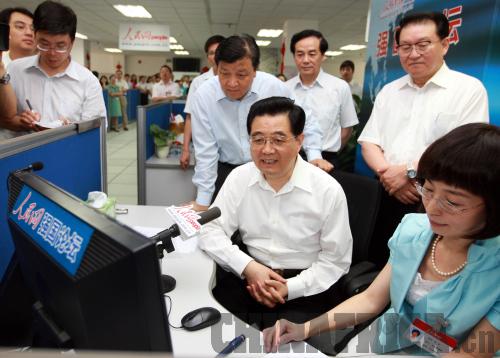|
 |
|
CONNECTING: Hu Jintao, General Secretary of the CPC Central Committee, chats to people online (JU PENG) |
New transfer
However, the rapid economic development also exerted negative influences upon other areas, resulting in, for example, the deterioration of environment and the increase of the gap between the rich and the poor. Meanwhile, owing to the rapid economic development, people's demands also diversified, adding more difficulties in the work of the CPC.
Targeting the problems, beginning in 2002, the CPC focused on the Scientific Outlook on Development in promoting China's further development. This concept means sustainable development is possible through tested and proven methodologies of governance.
"This concept means that the CPC will pay more attention to making China's development more sustainable; that is to say, we need to focus on the quality, not merely the quantity, of GDP growth, and see how it can better serve the people without harming their living environment," explained Dai.
At the climate summit held in Copenhagen in December 2009, Chinese Premier Wen Jiabao vowed to cut China's carbon dioxide emissions per unit of GDP by 40-45 percent by 2020 from the 2005 level. Prior to this, China's carbon dioxide emissions per unit of GDP had already been reduced by 46 percent in 2005 from the 1990 level.
Ears open
"To make the people happier, the ruling party must always know what people need and what people think about its policies," said Dai. "The CPC is increasingly expanding its communication channels with the people in every possible way."
In 2009, Chongqing Municipality in southwest China launched a program to encourage CPC members in the municipal government to immerse themselves in the farming community in order to learn more about their needs.
"Eating, living and working together with farmers are excellent traditions of the CPC in strengthening its connection with the ordinary citizens ever since its establishment, and should be carried forward now," said Hong Qiaojun, a news commentator on his blog. Hong once worked in the Yujiang County Government, Jiangxi Province and was dispatched to rural areas to work with farmers for one year. "Only when the Party members work together with farmers can they really understand their needs and keep farmers' interests in their minds while governing. I feel very strong about that."
Besides learning more about the people, the CPC is making efforts to be understood by the people. On June 30, 2010, the CPC introduced its first departmental spokespeople to answer queries at regular media conferences. "This way, the people can more conveniently understand the CPC's policies and what the Party will do in developing the country," Dai noted.
Apart from traditional communication methods, the Internet is now embraced by leading CPC figures as an effective way of keeping in touch with common people. The General Secretary of the CPC Central Committee and Chinese President Hu Jintao and Premier Wen are among the CPC leaders who regularly chat with the netizens with their real names to learn more about the needs of the common people.
In recent years, microblogs are becoming very popular, especially among the young people. Differing from other media, microblogs allow users to get immediate information from various sources.
On March 2, Zhang Chunxian, Secretary of the CPC Xinjiang Uygur Autonomous Regional Committee, opened his real-name microblog, becoming the first senior Party official of provincial level to have a microblog. Within one day, he had more than 10,000 fans.
"I often browse my microblog at 2-3 a.m.," said Zhang at a panel discussion during this year's session of the National People's Congress in March. "Then I start my day of work clearly understanding in which sectors we need to strengthen our work."
Only several months after he opened his microblog, he had solved hundreds of problems reflected by the netizens, including small problems like installing street lamps along an isolated road.
"The Internet has provided a very good way for the CPC to get people's opinions," said Dai. The Internet is a good platform on which one can make comments anonymously. "Maybe they [citizens] are not willing to say something directly to a leader, but they feel comfortable expressing their views on a microblog anonymously. This way, the CPC members can get the true information," Dai said.
Criticism
But Dai also warned that by using the Internet to solicit people's opinions, one should be ready to be criticized by the netizens for what they don't like.
Wu Hao is the head of the Publicity Department of the CPC Committee of Honghe Prefecture of Yunnan Province and he also has a microblog. "I often see netizens criticizing me on my microblog; it's OK for me and, actually, I am glad to see them because they remind me of the weak points in my work," he told This Week magazine.
"As a ruling party, the CPC should be magnanimous enough to listen to criticisms and should find out the reasons for being criticized," said Cai Zhiqiang, a scholar from the Party School of the CPC Central Committee in an interview with China News Service.
"It is natural to hear different voices since people have diverse demands. Today, China has many people who can earn millions or billions of dollars every year, as well as the disadvantaged groups whose annual income is no more than $3,000. It is very difficult for the CPC policies to cover everyone," said Cai.
He noted that under the current circumstances, certain groups of people couldn't enjoy the fruits of economic and social development during this time. "Enabling all the people to enjoy the benefits of economic and social development is the major task for the CPC in its future governance," said Cai. |